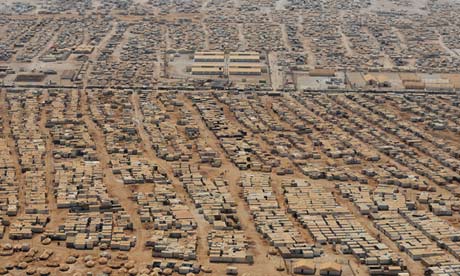Syria's exodus: a refugee crisis for the world
• Exodus from Syrian civil war is overwhelming region – UN
• Britain may be asked to take thousands of displaced people
• Aid officials say population flight is becoming permanent
• Britain may be asked to take thousands of displaced people
• Aid officials say population flight is becoming permanent

The Zaatari refugee camp near the Jordanian city of Mafraq shelters 115,000 Syrian refugees, posing a humanitarian crisis and a threat to global security, say UN officials. Photograph: Mandel Ngan/AFP/Getty Images
Western countries including the US and Britain may be asked to accept tens of thousands of Syrian refugees because the exodus from the civil war is overwhelming countries in the region, the UN's refugee chief has warned.
With no end to the war in sight, the flight of nearly 2 million people from Syria over the past two years is showing every sign of becoming a permanent population shift, like the Palestinian crises of 1948 and 1967, with grave implications for countries such as Lebanon and Jordan, UN and other humanitarian aid officials say.
One in six people in Lebanon are now Syrian refugees. The biggest camp in Jordan has become the country's fourth-largest city. In addition to those who have crossed borders, at least four million Syrians are believed to have been displaced within their own country, meaning that more than a quarter of the population has been uprooted.
In an interview with the Guardian, António Guterres, the United Nations high commissioner for refugees, said the situation was already far more than just a humanitarian crisis. If a resolution to the conflict was not found within months, the UN will look to resettle tens of thousands of Syrian refugees in countries better able to afford to host them, including Britain. Germany has already offered to take 5,000, but other offers have been limited, Guterres said.
"We are facing in the Middle East something that is more than a humanitarian crisis, more than a regional crisis, it is becoming a real threat to global peace and security," Guterres said.
"We are already seeing the multiplication of security incidents in Iraq and Lebanon, and Jordan is facing a very difficult economic situation."
Guterres compared the Syrian refugee issue to that of Iraqis during the last decade, when more than 100,000 were resettled away from the region. "If things go on for a prolonged period of time then resettlement will become a central part of our strategy," he said. "We would like when the time comes … to be able to launch a resettlement programme as massive as the one for Iraqis."
The Syrian exodus has already surpassed almost every other refugee crisis that international organisations have dealt with in the past 40 years. The Yugoslav wars of the 1990s provide the closest parallel, with both conflicts having a strong ethnic-sectarian dimension and the crumbling of state control raising the spectre of partition.
The knock-on effect on regional countries has been telling. Tensions between refugee communities and local populations have increased dramatically in Jordan and Lebanon, as the influx of people piles pressure on local services such as schools and hospitals, and disrupts job markets. The upshot has been a greater effort by Syria's neighbours to manage the flow of refugees into their countries.
"Turkey and Jordan have become so overwhelmed. At the same time there are some very worrying consequences on the security point of view, with the infiltration of armed people, that the border has had to be more controlled. This means refugees are still coming, but they have to come in gradually, which means we have a number of people stranded waiting to cross," Guterres said.
Some refugees have found life so wretched in camps that they have started to return home. But at present this is still a trickle.
"They are not going home, and nor can they be expected to at a time when communities are being slaughtered and Syria is disintegrating," said one Jordanian official who declined to be named. "We are living the reality of a long and devastating war with perhaps unmanageable consequences for us."
"The original expectation was that this was going to be a short wave of people that would quickly recede," said the EU's humanitarian commissioner, Kristalina Georgieva, who has twice visited Zaatari recently. "It has taken more than a year to recognise that this conflict is going to be long. We have been in contact with development organisations. We need urban managers, we need planners. We need permanent solutions."
Throughout the year, the UN has steadily increased its humanitarian aid appeal, which now stands at $5bn (£3.3bn) – the largest amount the global body has ever sought for a single crisis. The money would not just help refugees but assist Lebanon and Jordan to make the enormous social adjustments required to deal with rapidly expanding populations.
But Guterres said he was not optimistic the target would be reached. Gulf donors in particular such as Saudi Arabia, the UAE and Qatar appear to prefer to fund their own humanitarian activities rather than contributing to the general pot.
And needs are outstripping even the money raised so far. "The conflict produces more victims faster than our collective capacity to help," said Georgieva.
"When we look at the prospects, one that we all have to face is that this conflict is creating a large risk of sectarian cleansing. This is how Srebrenica happened, how Rwanda happened, by gradually building up this enormous wave that leads to catastrophic consequences. This is the [crisis] that makes me lose sleep."
With no end to the war in sight, the flight of nearly 2 million people from Syria over the past two years is showing every sign of becoming a permanent population shift, like the Palestinian crises of 1948 and 1967, with grave implications for countries such as Lebanon and Jordan, UN and other humanitarian aid officials say.
One in six people in Lebanon are now Syrian refugees. The biggest camp in Jordan has become the country's fourth-largest city. In addition to those who have crossed borders, at least four million Syrians are believed to have been displaced within their own country, meaning that more than a quarter of the population has been uprooted.
In an interview with the Guardian, António Guterres, the United Nations high commissioner for refugees, said the situation was already far more than just a humanitarian crisis. If a resolution to the conflict was not found within months, the UN will look to resettle tens of thousands of Syrian refugees in countries better able to afford to host them, including Britain. Germany has already offered to take 5,000, but other offers have been limited, Guterres said.
"We are facing in the Middle East something that is more than a humanitarian crisis, more than a regional crisis, it is becoming a real threat to global peace and security," Guterres said.
"We are already seeing the multiplication of security incidents in Iraq and Lebanon, and Jordan is facing a very difficult economic situation."
Guterres compared the Syrian refugee issue to that of Iraqis during the last decade, when more than 100,000 were resettled away from the region. "If things go on for a prolonged period of time then resettlement will become a central part of our strategy," he said. "We would like when the time comes … to be able to launch a resettlement programme as massive as the one for Iraqis."
The Syrian exodus has already surpassed almost every other refugee crisis that international organisations have dealt with in the past 40 years. The Yugoslav wars of the 1990s provide the closest parallel, with both conflicts having a strong ethnic-sectarian dimension and the crumbling of state control raising the spectre of partition.
The knock-on effect on regional countries has been telling. Tensions between refugee communities and local populations have increased dramatically in Jordan and Lebanon, as the influx of people piles pressure on local services such as schools and hospitals, and disrupts job markets. The upshot has been a greater effort by Syria's neighbours to manage the flow of refugees into their countries.
"Turkey and Jordan have become so overwhelmed. At the same time there are some very worrying consequences on the security point of view, with the infiltration of armed people, that the border has had to be more controlled. This means refugees are still coming, but they have to come in gradually, which means we have a number of people stranded waiting to cross," Guterres said.
Some refugees have found life so wretched in camps that they have started to return home. But at present this is still a trickle.
"They are not going home, and nor can they be expected to at a time when communities are being slaughtered and Syria is disintegrating," said one Jordanian official who declined to be named. "We are living the reality of a long and devastating war with perhaps unmanageable consequences for us."
"The original expectation was that this was going to be a short wave of people that would quickly recede," said the EU's humanitarian commissioner, Kristalina Georgieva, who has twice visited Zaatari recently. "It has taken more than a year to recognise that this conflict is going to be long. We have been in contact with development organisations. We need urban managers, we need planners. We need permanent solutions."
Throughout the year, the UN has steadily increased its humanitarian aid appeal, which now stands at $5bn (£3.3bn) – the largest amount the global body has ever sought for a single crisis. The money would not just help refugees but assist Lebanon and Jordan to make the enormous social adjustments required to deal with rapidly expanding populations.
But Guterres said he was not optimistic the target would be reached. Gulf donors in particular such as Saudi Arabia, the UAE and Qatar appear to prefer to fund their own humanitarian activities rather than contributing to the general pot.
And needs are outstripping even the money raised so far. "The conflict produces more victims faster than our collective capacity to help," said Georgieva.
"When we look at the prospects, one that we all have to face is that this conflict is creating a large risk of sectarian cleansing. This is how Srebrenica happened, how Rwanda happened, by gradually building up this enormous wave that leads to catastrophic consequences. This is the [crisis] that makes me lose sleep."

 The Court has established a dedicated Fax number for sending requests for
interim measures:+33 (0)3 88 41 39 00 Read
The Court has established a dedicated Fax number for sending requests for
interim measures:+33 (0)3 88 41 39 00 Read The data base of the Global Detention Project (GDP) updates on
migration-related detention practices (asylum seekers and irregular immigrants
until they can be deported). It already contains several reports on the practice
of european countries including information on the detention of asylum-seekers.
This website can be of interest for appeals procedures on Dublin cases.
SEE
The data base of the Global Detention Project (GDP) updates on
migration-related detention practices (asylum seekers and irregular immigrants
until they can be deported). It already contains several reports on the practice
of european countries including information on the detention of asylum-seekers.
This website can be of interest for appeals procedures on Dublin cases.
SEE A dozen of asylum seekers waiting for their expulsions were released by the
judges just before Easter.
A dozen of asylum seekers waiting for their expulsions were released by the
judges just before Easter. This project aims to provide better information about, and closer monitoring
of, asylumseekers in a Dublin Procedure .
This project aims to provide better information about, and closer monitoring
of, asylumseekers in a Dublin Procedure .
 Photographer:
Katie Basbagill
Photographer:
Katie Basbagill 








